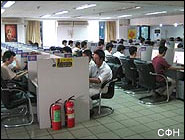Psychologists rehabilitated gamers
A group of German psychologists, having conducted a series of studies in virtual reality, presented their portrait of a typical online gamer, which is very different from the common cliche.
Gamers who spend their free time in the virtual worlds of multiplayer online games are not uncommunicative loners suffering from Internet addiction and violence, but sociable young people who prefer large companies and choose appropriate leisure methods. This was stated by German psychologists and sociologists, having studied the behavior of gamers in their "natural habitat", writes die Welt.

The sociologist from Trier, Waldemar Vogelgesang (Waldemar Vogelgesang) and a specialist in the field of communication theory, a professor from Bremen, Andreas Hepp (Andreas Hepp) talked on the web with the participants of the popular game World of Warcraft (more precisely, with their characters in this game). In the virtual world, they appeared to be “ethnologists who are trying to establish contact with unknown races in their usual habitat conditions”.
')
Representatives of the “unknown races” demonstrated sociability and high competence in the field of technical issues related to their virtual “professions”. The majority of the population was between 14 and 17 years old, among them were young men with a fairly high level of education.
Sociologists Robert Seifert and Sven Joeckel surveyed World of Warcraft players and found that since 2005 their motivation has changed significantly. If earlier they played for the thrill, intense rivalry and to explore an unfamiliar world, now the communication with other players has come to the fore. “A person spends more time in the game, but not for the sake of battles and missions, but for the sake of communicating with friends whom he met here,” the scientists state.
Professor Erfurt Friedrich Krotz (Friedrich Krotz) considers multiplayer computer games a new category of communication. Along with personal contacts between people and mass communication, interactive communication arises, the means and simultaneously the participant of which is the computer equipment. Krotts expects that in the future the technique will be improved in this direction. “Things will have the ability to communicate, that is, in a certain sense, they will become alive,” says Krotz.
Scientists expect that online games in the future will firmly enter everyday life. This is evidenced by the fact that players over 35 are no longer a rare exception. And among them there are a lot of people who have learned to combine their hobbies with work and family life. When the current generation of young gamers matures, online games will become a popular form of recreation among adults, "serious" people.
"Source: cnews.ru "
Gamers who spend their free time in the virtual worlds of multiplayer online games are not uncommunicative loners suffering from Internet addiction and violence, but sociable young people who prefer large companies and choose appropriate leisure methods. This was stated by German psychologists and sociologists, having studied the behavior of gamers in their "natural habitat", writes die Welt.

The sociologist from Trier, Waldemar Vogelgesang (Waldemar Vogelgesang) and a specialist in the field of communication theory, a professor from Bremen, Andreas Hepp (Andreas Hepp) talked on the web with the participants of the popular game World of Warcraft (more precisely, with their characters in this game). In the virtual world, they appeared to be “ethnologists who are trying to establish contact with unknown races in their usual habitat conditions”.
')
Representatives of the “unknown races” demonstrated sociability and high competence in the field of technical issues related to their virtual “professions”. The majority of the population was between 14 and 17 years old, among them were young men with a fairly high level of education.
Sociologists Robert Seifert and Sven Joeckel surveyed World of Warcraft players and found that since 2005 their motivation has changed significantly. If earlier they played for the thrill, intense rivalry and to explore an unfamiliar world, now the communication with other players has come to the fore. “A person spends more time in the game, but not for the sake of battles and missions, but for the sake of communicating with friends whom he met here,” the scientists state.
Professor Erfurt Friedrich Krotz (Friedrich Krotz) considers multiplayer computer games a new category of communication. Along with personal contacts between people and mass communication, interactive communication arises, the means and simultaneously the participant of which is the computer equipment. Krotts expects that in the future the technique will be improved in this direction. “Things will have the ability to communicate, that is, in a certain sense, they will become alive,” says Krotz.
Scientists expect that online games in the future will firmly enter everyday life. This is evidenced by the fact that players over 35 are no longer a rare exception. And among them there are a lot of people who have learned to combine their hobbies with work and family life. When the current generation of young gamers matures, online games will become a popular form of recreation among adults, "serious" people.
"Source: cnews.ru "
Source: https://habr.com/ru/post/18934/
All Articles